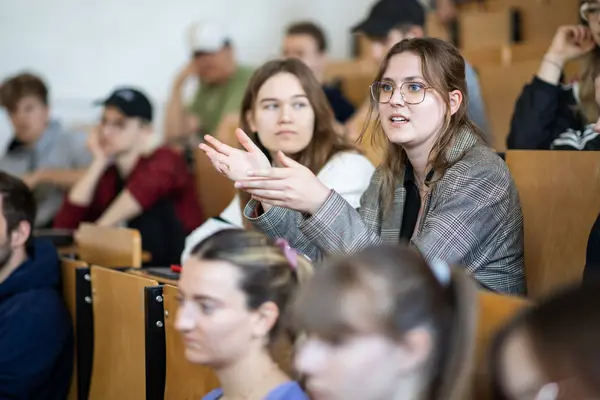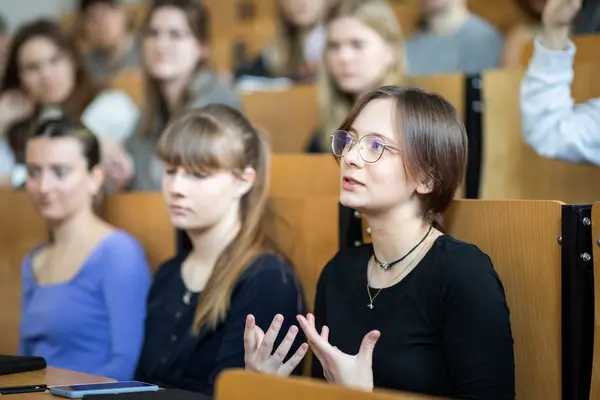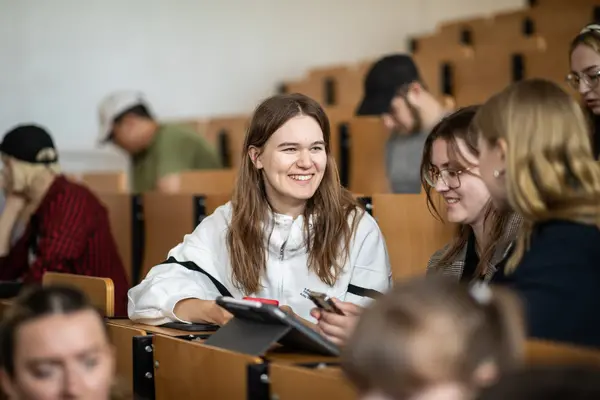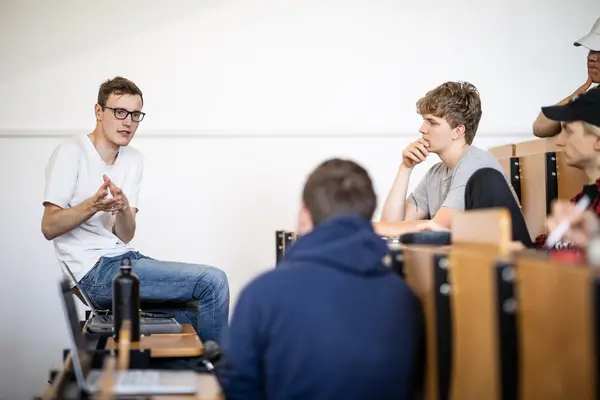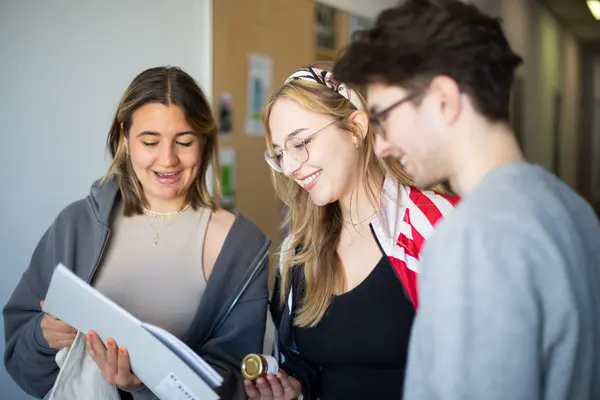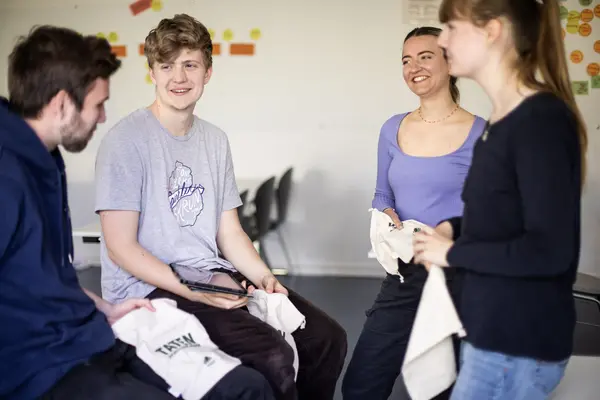Individual study contents
In the basic studies you will learn the basics of business administration, economics and sustainability with a high level of practical relevance. You will test your acquired knowledge in a practical project. Afterwards, you can build up an individual career profile according to your personal interests by choosing one of two specialisations. You can choose from: Responsible Business Management, Sustainability Marketing, Public Benefit Oriented Innovations & Entrepreneurship, Regional Development & Transformation and Sustainable Value Creation in SMEs.
Modules per semester
In the first semester, you will be taught the basics of economics, a business approach and thinking as well as mathematical and scientific methods. At the same time, the basics of sustainability are covered in the sub-modules "Introduction to Sustainable Development" and "Ethics".
The module Business Administration 1 comprises three sub-modules.
In the sub-module General Business Administration (ABWL) , we classify business administration functions in the canon of social sciences, explain to you the object of knowledge in the context of sustainability and explore topics, objectives as well as the organisation and management of companies on this basis.
The accounting sub-module gives you an insight into the basics of business accounting.
The Human Resources sub module introduces you to the working world of the future. Aspects such as demographic change, digitalisation and their effects on company policy are dealt with. Personnel management issues in companies are explained and selected labour law personnel topics are highlighted.
This module focuses on the basics of microeconomics as a sub-discipline of economics. We teach you models of microeconomics and put them up for discussion. Building on this, you will receive an introduction to the microeconomically based aspects of environmental economics.
The module Responsibility Competences comprises two sub-modules.
In the ethics sub-module , we deal with how ethical principles are related to sustainability and can be applied to economic action in order to realise social-ecological responsibility.
The sub-module Self-Management offers you tools to take on your own responsibility both in your studies and in society and as future managers.
The module Mathematics in Economics comprises two sub-modules.
TheFundamentals of Mathematics sub module offers you you the theoretical and practical foundations for basic mathematical competence with a focus on sustainability and economics.
The submodule Computational Mathematics conveys you an application-oriented approach to problems in practice.
The module Sustainability and Science comprises two sub-modules.
The submodule Introduction to Sustainable Development is designed as an interdisciplinary introduction to sustainable development. Lectures given by lecturers from all subject areas form the basis of a concrete practical project work on the topic of sustainability with associated scientific contributions.
The sub-module Scientific Work leads you into scientific activity within the framework of the degree programme and beyond. It is explained when and how scientific work is done. In addition, concrete approaches are taught on how to write scientific papers.
The second semester builds on the topics covered in the first semester by deepening the knowledge of core areas of business administration in the context of BWL 2 as well as environmental management and expanding knowledge of economics through macroeconomic perspectives. In the second semester, we focus on the integration of modern information technology for management and statistics.
The module Business Administration 2 deepens the functions of business administration in three sub-modules.
The sub-module Operational Management provides basic methods and tools for effective service provision and quality assurance.
The submoduleCost Accounting and Controlling deals with internal accounting. You will be taught basic knowledge of cost and revenue type accounting, and topics such as cost transparency, cost planning and control, and cost allocation will be covered.
In the sub-module Financing and Investment, you will develop a basic understanding of the principles and theories of finance with concrete application references.
This module focuses on macroeconomics as a sub-discipline of economics. We elaborate, analyse and discuss with you macroeconomic modelsand look at theoretical and real approaches to sustainable economic systems.
In this module you will acquire Knowledge about the environmental management of organisations (industry, trade, service providers, authorities). Environmental aspects are e.g. energy consumption, emissions, waste or waste water, but also indirect factors such as the lifetime of products, administrative and planning decisions or the behaviour of stakeholders.
The module Statistical Methods in Economics comprises two sub-modules.
The submodule Fundamentals of Statistics offers theoretical basics and methods for the processing and interpretation of statistical data.
The submodule Computational Statistics teaches you a application-oriented handling of statistical problems and their graphical representation.
The Management Competences module comprises two sub-modules.
In the sub-module Digital Applications in Business Management Practice deals with the use of basic software applications. This is supplemented by the presentation and application of agile tools of the APP-/cly-based management, e.g. social business applications.
The sub-module Project Management introduces you the basics of initiating and managing projects with digital tools. The practical management of projects is tested on the basis of concrete cases.
In the third semester, business management perspectives are complemented by strategic, market-oriented aspects as well as legal framework conditions for successful sustainable management. You can supplement your competence profile with elective modules.
The module aims to provide you with a basic understanding of the tasks of marketing within market-oriented corporate management. The focus is on the analytical and conceptual understanding of a modern management process for securing the company in the long term and on operative marketing planning.
The module Legal Frameworks in the Context of Sustainability comprises two sub-modules.
In the sub-module Taxes illuminatesn we examine economic processes that are taxed in the German tax system taxed and presents the tax system in a social context. Nn addition to economic aspects of taxation we consider social and ecological aspects.
The sub-module Economic and Environmental Law verprovides you with a basic understanding of business and environmental law and its impact on business decisions.
The module Social Competences comprises two sub-modules.
The sub-module Service Learning teaches you social competences that focus on committed and self-responsible action with reference to sustainable development.
The sub-module Intercultural and Communicative Competence gives you acquire basic knowledge in the field of intercultural and communicative competence acquirein order to be well prepared for the practical project and a possible stay abroad in the fourth semester.
Business English B2, Business English C1, Further language training
In order to deepen your language skills you must choose one module from the list of compulsory elective language training modules. Students who can prove that they have English language skills at level C1 may choose an additional foreign language.
In the fourth semester, you complete a 20-week internship, which is already prepared in the third semester and organised by the students themselves.
The module consists of two sub-modules.
The sub-module Internship aims to you work on a technical task or project in a (supra)regional organisation (company, authority, association, etc.). In doing so, you gain practical experience in this organisation. She apply the professional, methodological and social competences taught in the degree programme.
The sub-module Internship Supervision includes a seminar that you in Iyour practical experience and stimulates a topic-related reflection.
In the fifth semester, in addition to the compulsory subject Sustainable Management of Limited Resources, the competence specialisation takes place through the chosen two specialisations. You will complete a total of four modules (two per specialisation). In the sixth semester, you will be offered one additional module from each of the selected specialisations.
The module focuses on the work of the Sustainable Economy Department in HNEE's Research Cluster 3 "Sustainable Management of Limited Resources". You receive an overview of the project / transfer and research results that relate to the research focus 3 and deal with them.
This includes the modules:
- Sustainable customer management: You will acquire skills for building and maintaining customer relationships for the sale of sustainable products. The development of post-materialism and digitalisation as key determinants of changing consumer behaviour must be understood and considered in the context of customer relationship management.
- Sustainable product management: Mastering the fields of action of product policy is a key success factor for the marketing of sustainable service offerings. In addition to developing methods and concepts for acquiring and evaluating product innovations, you will learn about the specific design of sustainable products (including quality, packaging, brand and service). The relevance of comprehensive product responsibility (product stewardship) is illustrated using the product life cycle.
- Sustainable communication management: The communication of sustainability topics is aimed at the relevant stakeholder groups of the company and is crucial for ensuring that the commitment and assumption of responsibility for the environment and society (corporate social responsibility) has a positive impact on the reputation of the company. The module will show you the targeted use of communication tools (offline and online) to promote the sale of sustainable products. Current concepts of corporate sustainability communication are developed and evaluated.
These include the modules:
- Awareness: This module provides you with a special awareness of sustainability. The focus is on the further development of appropriate good governance and compliance for all stakeholders. You will learn and develop tools for setting up sustainable companies/corporate structures/processes. Skills for developing responsible corporate visions are promoted.
- Resource management and environmental management: Ecodesign and life cycle assessment (incl. transport), resource and environmental management systems and the handling of complex systems (dealing with exogenous shocks) are addressed, as is the development of analysis, forecasting and decision-making tools
- Stakeholder management: The module focuses on the topics of exerting influence and participation. You will learn how influence and participation can take place in the area of political/parliamentary processes. The stakeholders relevant to business practice are analysed and the interpretation of laws is practised. In addition, the basics of responsible influencing of legislation (lobbying) are taught and applied to case studies.
This includes the modules:
- Social Innovation and Social Design: In this module, you will deepen and combine questions on social innovation and social design. The aim is to provide you with a well-founded theoretical basis against the background of digital and sustainable transformation processes in order to find ways for social innovation through to the development of marketable, sustainable products and services using the approaches to social design and entrepreneurship for the common good.
- Sustainable Entrepreneurship: The Sustainable Entrepreneurship module deepens and links issues relating to start-ups that are oriented towards the common good and their financing. You will design your own fictitious social business and allow it to participate in market activities as part of a computer simulation.
- Sustainable HR management: Employees are an important resource for companies, as their performance makes a significant contribution to economic success. For this reason, many companies are increasingly focussing on sustainable HR management. The module shows you how to organise sustainable and innovation-oriented HR management as well as current challenges.
These include the modules:
- Fundamentals of Regional Economics and Public Activities: In the sub-module ‘Fundamentals of Regional Economics’, after clarifying basic terms (e.g. region), you will be taught the fundamentals of regional economics including classical regional development approaches and mirrored against reality. We discuss various regional disparities and development approaches. The sub-module ‘Fundamentals of public activities and services of general interest’ deals with the public sector as an important driver of regional development. You will learn when and how these public actors become active. A special focus is placed on the topic of services of general interest.
- Change through innovation in the region: We focus on specific tools for managing scarce resources in a regional economic context. With a view to the tense relationship between the desire for regional growth on the one hand and diverse shrinking tendencies on the other, alternative development paths are discussed and devised with the help of suitable tools (analytical, participative, creative).
- Sustainable transformation: A common goal: You apply the skills you have acquired in specific practical and problem situations and deepen your soft skills (e.g. self-management and project management, communication, moderation). Regional stakeholders receive new impetus and support on the path to transformation and sustainable regional development. The module is designed as an accompanied/guided practical project.
These include the modules:
- Sustainable Business and Solutions: You will receive an introduction to the structure and function of renewable energies onshore and offshore (e.g. hydrogen, wind and hydropower, biofuels, heat transition in urban neighbourhoods) as well as solutions for energetic neighbourhoods and their application to sustainable business models for the establishment of companies and company succession. The recognition and precise filling of gaps in required sustainable solutions as well as gaps in the regional business stock to complete regional value chains and secure regional employment is teaching content. You will learn how to build sustainable corporate structures and business processes that are modelled in the PC laboratory. Likewise, an operational and visionary development of employee- and participation-oriented business models with increased reference to legal forms that promote sustainability, such as cooperatives for the collective acceptance of sustainable solutions.
- Value-added-oriented business management: We show you the development of resource-saving value chains and business management, the efficient organisation of sustainable regional material and economic cycles and innovative, productivity-oriented and sustainable thinking and action in industrial and service companies. Your skills: Understanding of operational processes and management of SMEs.
- Work 4.0: You will receive knowledge on sustainable digitalisation for Work 4.0, social partnership and New Work that is close to the company and ready for application in the company. This includes the following knowledge: Participation management with modern methods of work organisation and employee participation in SMEs, sustainable and social partnership management techniques, technology assessment with life cycle assessment, scenario and forecast analysis, benchmarking, technical due diligence, employee participation models, sustainable, employee- and participation-oriented introduction of and order processing with ERP systems. Your skills: Practical exercises in the PC lab and on-site deployment in SMEs to work on operational issues.
The first two modules are completed in the fifth semester. The last module of each specialisation is taken in the first half of the sixth semester. sixth semester. In addition to the two compulsory specialisations, further modules can be chosen optionally according to availability.
In the sixth semester, you will be offered a further module from the chosen specialisations.
At the end of the degree programme, a first academic thesis is written. The focus can be on one of the specialisations or related subject areas. The final thesis and the accompanying Bachelor's seminar start in the second half of the 6th semester. In addition to professors and university staff, practical partners can also be involved in the supervision.
In the 6th semester, in addition to the final thesis and the two specialisations, there is space for a further compulsory elective module according to the offer.
